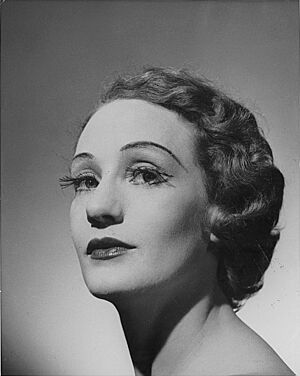Laurel Martyn facts for kids
Quick facts for kids
Laurel Martyn
|
|
|---|---|

Helmut Newton's 1952 portrait of Laurel Martyn, National Library of Australia
|
|
| Born |
Laurel Gill
23 July 1916 Toowoomba, Queensland, Australia
|
| Died | October 16, 2013 (aged 97) |
| Occupation | Ballet dancer |
| Spouse(s) |
Lloyd Lawton
(m. 1945) |
Laurel Martyn was a famous Australian ballerina, born Laurel Gill on July 23, 1916. She was known for her amazing dance skills and for creating new ballet works. Laurel Martyn lived a long life and passed away on October 16, 2013, at the age of 97.
In 1933, Laurel Martyn traveled from Australia to England to study ballet. She learned from a well-known teacher named Phyllis Bedells. In 1934, she won a special scholarship for her first dance creation, called Exile. This award came from the Association of Operatic Dancing, which is now known as the Royal Academy of Dance.
A year later, in 1935, Laurel Martyn made history. She became the first Australian to win the Adeline Genée Gold Medal. This is a very important award for young ballet dancers. Later that year, she joined the Vic-Wells Ballet in London, which is now called Sadler's Wells. She was the first Australian woman to join this famous company. By 1938, she had become a soloist, meaning she performed important individual dances.
Contents
Early Career and Return to Australia
In 1938, Laurel Martyn returned to Australia. She began teaching dance and sharing her knowledge. In 1940, she joined the Edouard Borovansky Ballet, a leading ballet company in Australia at that time. She danced with them until 1945, when she married Lloyd Lawton. Even after getting married, she continued to dance and contribute to the world of ballet.
Creating New Australian Ballets
After leaving the Borovansky Ballet in 1945, Laurel Martyn started to create her own ballets. She wanted to tell Australian stories through dance. Two of her most famous works were The Sentimental Bloke Who Couldn't Be a Man (1952) and Mathinna (1954).
The Sentimental Bloke was inspired by Australian literature. Mathinna told the story of an Aboriginal Tasmanian girl who was adopted into white society. This ballet explored important ideas about different cultures and how people relate to each other.
Inspiring Future Dancers
Laurel Martyn also helped create the Young Dancers' Theatre. For this group, she choreographed many new dance pieces in the 1980s. She also helped start the Classical Dance Teachers Australia Inc. This group provided special training for dance teachers. Her work helped many young dancers and teachers in Australia.
Images for kids
 | Jessica Watkins |
 | Robert Henry Lawrence Jr. |
 | Mae Jemison |
 | Sian Proctor |
 | Guion Bluford |



